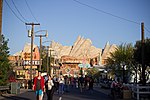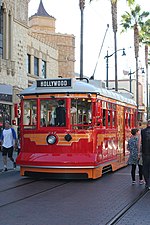Melodyland Christian Center
Buildings and structures demolished in 2003Defunct Christian schools in the United StatesDefunct schools in CaliforniaDemolished buildings and structures in CaliforniaFormer Pentecostal churches
Melodyland Christian Center was a church in Anaheim, California, that was located a short distance east of the Disneyland Resort. The Melodyland Theater and surrounding campus started as a theater in the round and later became an evangelical Christian church led by Pastor Ralph Wilkerson. The Melodyland theater and all the buildings on the church campus were demolished in 2003. Part of the Anaheim GardenWalk was later built on the site.
Excerpt from the Wikipedia article Melodyland Christian Center (License: CC BY-SA 3.0, Authors).Melodyland Christian Center
Gardenwalk Parking Structure Exit, Anaheim Anaheim Resort District
Geographical coordinates (GPS) Address Nearby Places Show on map
Geographical coordinates (GPS)
| Latitude | Longitude |
|---|---|
| N 33.80643383897 ° | E -117.91248944964 ° |
Address
Anaheim GardenWalk
Gardenwalk Parking Structure Exit
92802 Anaheim, Anaheim Resort District
California, United States
Open on Google Maps








